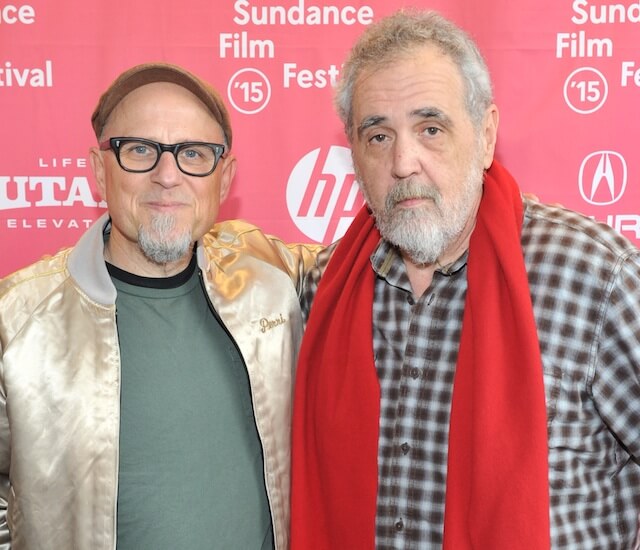I ask Barry Crimmins, a god among comics, and not just to other comics, has any time during his press tour stop in New York to have any fun.
“Oh, I’ve had plenty of fun,” Crimmins replies with a knowing chuckle.
He’s in town to promote “Call Me Lucky,” a documentary made about his legacy, as well as his history as a victim of child abuse. It was made by Bobcat Goldthwait, to whom Crimmins was once a mentor and is a longtime friend. While here he wants to work on his act at alt-comedy spots, though the famously grouchy comic is annoyed at how amateur some amateur comics can be. “There are too many acts who don’t know the simple term ‘take the stage,’” Crimmins tells us. “You don’t walk out meandering, asking ‘How you doin’?’ — rhetorical questions to 200 people. The first thing you say should be pithy and funny and germane to a common experience — to show them you’re quick, you’re on top of stuff.” Crimmins says he’s had a million opening lines over the years. “I used to walk out and say” — he adopts a joyless, depressed tone — “‘Thanks a lot, I’m really psyched.’”
Goldthwait, also here, has had lines too. “I just jettisoned it, but for awhile it was, ‘Yeah, you don’t look the same either,’” he says through a chuckle. In the ’80s Goldthwait got sucked into movies — movies he’s open about deploring, like three “Police Academy”s and the talking horse comedy “Hot to Trot.” “There’s a weirdness when I go on stage for a beat or two. Though when I’m playing clubs in New York and L.A., which I really like, I’m going up for millenials, where I don’t come with the baggage of being an ’80s icon. They’re being exposed to me for the first time, which I really like.” Halfway through the last decade Goldthwait suddenly transitioned into an acclaimed filmmaker, making dark, low-budget comedies, including “World’s Greatest Dad,” starring his longtime friend, the late Robin Williams, and “God Bless America.” “Most people don’t know I’m a filmmaker. Most people think I’m dead. When I ego surf on Twitter, most of the things people are commenting on are that some guy from ‘Big Brother’ sounds like my character from the ’80s,” Goldthwait says. “I didn’t start making movies to reinvent myself. I started making movies because I really love making movies. That’s it. They’re not for everyone.” Goldthwait originally conceived of “Call Me Lucky” as a fiction film, with an actor playing him. Screenplay attempts by both didn’t go so well, and it was Robin Williams who suggested it be a doc. He also put up some of the initial money. Like some of his films, “Call Me Lucky” revolves around a malcontent, albeit a real one, though he’s reluctant to find too many specific connections between Crimmins and his other protagonists. “I did a Bigfoot movie [‘Willow Creek’], and a movie with Robin Williams. So I like stories about hairy men who live in the woods, apparently,” Goldthwait jokes.
“I only blew the one dog,” Crimmins adds, alluding to “Sleeping Dogs Lie,” Goldthwait’s actually very insightful film about the impossibility of true intimacy that begins with a woman who indeed services her dog. Crimmins is a “political” comedian, which is to say he talks politics, but not in the usual way. Sometimes he’s barely telling jokes — just rattling off funny, cranky, brutally honest assessments of, usually, those on the right-wing of the culture. Sometimes he’s done these on popular late night programs without softening his act. “I think there’s more political comedy out there than people realize,” Crimmins says. “It’s just not labeled as such when reactionaries do it. When a reactionary does it, it’s all part of the fun and well put under the umbrella of comedy. But if you’re a progressive then you’ve got to be labeled. Then they go, ‘How come all the political comics are lefties?’ Well, they’re not lefties, most of them. There’s a lot of political humor. If you’re a misogynist, if you’re a bigot, if you’re a homophobe, you’re taking a political stance.” You don’t have to try hard to get Crimmins to talk about gun control, even if our chat happened not only after two separate massacres in the span of about a week. “You know what, the majority of Americans have been opposed to this s— for forever,” he charges. They’re just being manipulated by forces with more power. “The whole thing is just illiteracy. The second amendment was largely there as a bone they threw to the slave states, so you could form a militia and chase down slaves. If you think guns are patriotic, you also think slavery is patriotic. Go f— yourself — in the nicest way possible.” Crimmins, of course, doesn’t mince words, but he knows, better than anyone, on how to mix hard-line politics with jokes. “You’ve had the right to bear arms for over 200 years. Fine. Now bear arms from over 200 years ago,” Crimmins says. “When was the last time someone was held up with a concealed musket?” Crimmins’ yen for speaking truth to power — he was also on Air America last decade — connects with the exploration of his child abuse, the major focus of the doc’s second half. The quietly grim title refers to how he was able to, unlike many other abusers, move on and turn his tragedy into something positive, which is to say speaking out against child abuse. In the early days of AOL, he staged a campaign to stop the Internet giant from allowing chat rooms populated for pedophiles, who would rack up huge bills by staying online for untold hours. As the film has played festivals, he’s found many talking to them about their own similar experiences. “I knew when we came out with this movie, I knew that part was coming. And it sure has. I’m sorry I’m right,” Crimmins says. “This is the most easily covered-up crime in the world. There’s a lot of people who would say nothing ever happened to me. “People are saying, ‘Well, come we’re hearing so much about it now?’ Because we’re starting to hear about it. It’s not like there was less of it in the past.”
Goldthwait understands the heavy burden that comes with his film. “If the movie can be part of making people feeling that these things can be discussed, that’s great,” he says. “It’s going to take some heat because it’s one of the first flags on the beach. But the thing is when it come to being able to talk about and disclose about these events, people should be comfortable.” “If you’re a crime victim, you have nothing to be ashamed of,” Crimmins adds. “When people use words like ‘admit,’ they’re implying complicity. If you read in the paper that someone said he admitted to being held up at gunpoint, it would sound very weird to you. But people ‘admit’ they were abused all the time in the paper.” Crimmins says correcting people’s idea of how to portray abuse will help everyone. “More victims will feel less intimidated about coming forward. Many of them, when they were abused, were told at very formative times in their lives that if they say anything their family would be killed or they would never see their parents again. Think of the crap you bought as a kid,” says Crimmins. “Now think about how much gullible you would be after suffering some heinous thing, and they admonish you. That’s why it’s important to be careful about never saying an abuse victim ‘admitted’ anything.”
Bobcat Golthwait and Barry Crimmons on ‘Call Me Lucky’ and the illiteracy of the NRA

Getty Images
Follow Matt Prigge on Twitter @mattprigge


















